
AMALGAMATED SOCIETY OF RAILWAY SERVANT
Founded 1871
1913 amalgamated to become the National Union of Railwaymen
In 1872 branches of the A.S.R.S. were formed on the L.B.S.C.R., these branches included Enginemen and railwaymen from all the various railway grades within the L.B.S.C.R.
NEW CROSS
BRIGHTON No.1
BATTERSEA
CROYDON
Railway accidents on the
L.B.S.C.R.
from http://www.railwaysarchive.co.uk
AMALGAMATED SOCIETY OF RAILWAY SERVANT
Founded 1871
1913 amalgamated to become the National Union of Railwaymen
In 1872 branches of the A.S.R.S. were formed on the L.B.S.C.R., these branches included Enginemen and railwaymen from all the various railway grades within the L.B.S.C.R.
CROYDON
BRIGHTON
CHANGING TIMES ON THE BRIGHTON RAILWAY
This has been adapted from the original article that appeared in the Railway World Magazine in December 1984. The article was written by Michael Cruttenden.
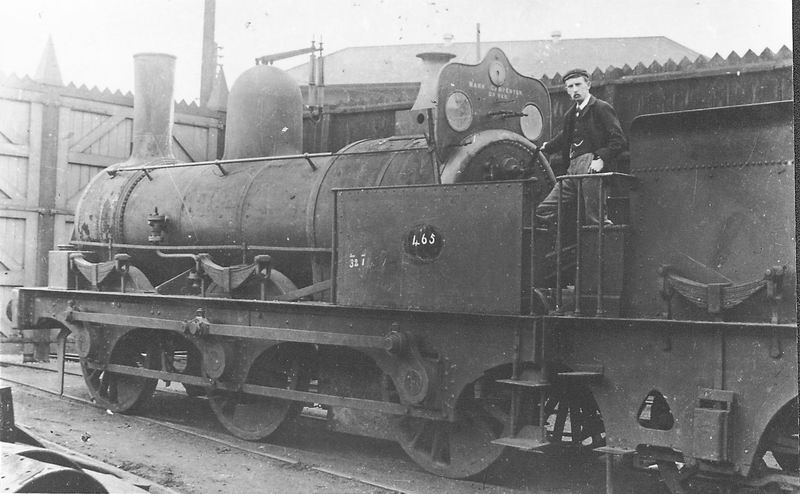
ACCURATE INFORMATION about the relationships between employer and employee during the mid - Victorian years before the growth of the trade unions is difficult to discover,
especially in any form other than very general terms. This lack of easily available detail has
forced many a modern historian to make recourse to statistics to illustrate their work, a
regrettable practice giving rise to all sorts of usually incorrect interpretations. Records on a
local level are even more difficult to find so, when a batch of accounts dating from the 1870s and covering a series of industrial negotiations on the London Brighton and South Coast Railway was recently discovered, it seemed an ideal opportunity to reconstruct events by allowing the accounts to speak for themselves, adding only where necessary a historical
background by way of explanation.
England's financial crisis of 1866, brought about mainly by the failure of the Overend and
Gurney bank that May, spelt the beginning of the end for the old L.B.S.C.R. Company. The
inevitable finally came in 1867 when the Railway's strained financial position pushed it to the very edge of bankruptcy; the board of directors was forced to declare that no ordinary share dividend would be paid that year. The situation had been worsened by the board’s
mishandling in March of a dispute with engine drivers over working hours. This resulted in
an unnecessary two day strike that forced the Company to seek Board of Trade arbitration.
Disenchanted with the directors' financial incompetence and out-moded policies, the
shareholders finally ousted them all. Within a year the entire board had been swept away,
replaced by people more in touch with the reality of the changing times and who were to
guide the Company through the next 30 years or so. Samuel Laing M.P, Chairman of the
L.B.S.C.R. from 1848-55, was brought back and a new Company Secretary, Allen Sarle, was installed as his assistant. Between them, they began to lay the foundations for the gradual recovery of the Company, a task greatly assisted over the next few years by other notable staff changes that were to alter radically the relationship between the Company and its employees.
In 1869, George Hawkins, Traffic Manager since May 1850, retired and was replaced by
John Peake Knight from the South Eastern Railway. Later that same year, the Company’s
Locomotive Superintendent, the much maligned John Chester Craven, tendered his
resignation for the third time and it was finally accepted. His replacement was William
Stroudley who took office from 1 February 1870. With the help of a few talented assistants
and some influential friends, he was to change the L.B.S.C.R.’s image for ever.
By 1869, the country's economic climate began to change and a revival of trade heralded a
period of renewed prosperity between 1870 – 73 for the majority of the working population.
This change, coupled with the social reforms introduced after the return to power, in the
election of November 1868 of a Liberal government under William Gladstone, produced the
favourable conditions under which England's working population once again felt able to
press for some improvements in their wages and working conditions. The focus of their
expectations crystallised into a campaign to reduce the period of continuous labour to nine
hours per day. The ‘nine hours movement', as it came to be known popularly, first grew to
prominence among engineering workers in the northeast. It quickly gathered support,
spreading eventually throughout the country and its significance was not lost on the
L.B.S.C.R.'s senior management.
By 1870, the movement had reached London and, when signs of impending agitation began to appear among those employed at the L.B.S.C.R.'s New Cross Works (always the Company’s most militant group of employees) both Locomotive Superintendent and General Manager (J. P. Knight's title had been changed from 1 January 1870) realised the inevitability of the movement.
Any opposition to it would be clearly futile and quickly lead to a serious confrontation with
the men just at the time when the Company was experiencing the beginnings of an upturn in
its fortunes. As such a confrontation would be disastrous for the Company's recovery, both
men expressed their fears to the L.B.S.C.R.'s board in the autumn of 1871. Immediately, they received support from the Chairman, Samuel Laing, who appears to have regarded the nine hours movement with a certain degree of enlightened sympathy. Acting on the advice of their managers, and guided by the Chairman, the board sensibly decided to act without waiting to be approached.
On Saturday, 11 November 1871, they announced his long-felt view that rune hours should be that they would concede a decrease in the recognised working man's day so that he men's working hours. The news was well might be allowed a fair amount of recreation received, such that the men decided to hold and a chance to enjoy his domestic life. He public demonstration as an expression of went on to give some indication of his views their approval.
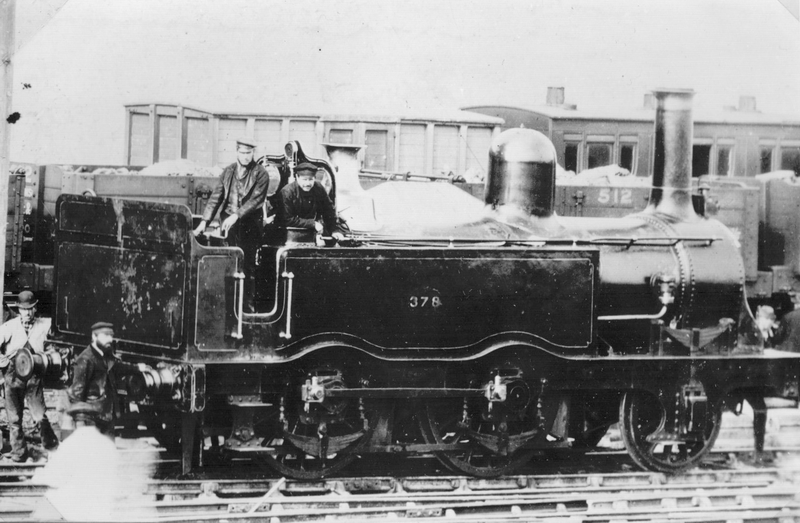
The afternoon of 18 November saw an estimated 1,400 Brighton men, together with a
contingent of 300 or so from New Cross, assembled in the New England Road yard. Members of the Works' negotiating committee with their chairman, James Webley, at the head led the way, followed. by the Brighton Railway Works band. Next came the men from the various departments, each shop with its flags and banners headed by the respective foremen, followed at the rear by the Brighton Town Band. The procession wound its way out of the yard up the hill via Chatham Place to Dyke Road where a stop was called outside Balnaiti House, the home of William Stroudley, the man whom the men considered to be mainly responsible for the introduction the of shorter working hours. In response to cheers from the street, Stroudley appeared at a window to acknowledge their greetings.
The procession then moved on to Montpelier Road, down North. Street and finally along
Marine Parade to No 1 Eastern Terrace, the residence of the Brighton Company's Chairman.
Upon their arrival, Mr Laing came outside to meet them, an act that was enthusiastically
received. A deputation came forward to be presented to him by Mr Trangmar, Chairman of
the Brighton Railway Provident Society. At its head there was Mr Webley of the turners’
department, who presented Mr Laing with an illuminated address expressing the men’s
appreciation and their hope that the friendly relations so produced might continue. A similar
address was presented on behalf of the New Cross contingent by a Mr Pawley. In reply, Laing thanked the men for their good wishes, but declined to accept all the credit, saying that Messrs Stroudley and Knight, together with his fellow directors, all deserved their fair share of praise. He continued by expressing his long-felt view that nine hours should be recognised working man's day so that he be allowed a fair amount of recreation and a chance to enjoy his domestic life. He went on to give some indication of his views regarding the question of wages in the future and that this was a separate matter from the nine hours movement. On their journey back to the New England Road
At the Company's annual general meeting held at the London Bridge terminus on Wednesday, 24 January 1872, the Chairman informed the shareholders that the cost of the concession over the nine hours movement would be some £3,000 annually.
The changes in the economy during this period also brought in their wake altered social
attitudes that enabled the Gladstone government to introduce a number of reforms, including the passing of the Trades Union Act of 1871 which paved the way for the establishment of the first lastingly successful railway trades union. The Amalgamated Society of Railway Servants, formed the very same year as the Act, established a branch in Brighton in 1872. It should be added that there was none of the acrimonious opposition that greeted the establishment of similar branches on other railways.
Although the A.S.R.S. played no recorded part in what follows, the significance of this
milestone in social history should I feel not go unrecorded for it illustrated the difference
between old and new L.B.S.C.R.. boards towards the Railway's employees.During the winter of 1871/72, the L.B.S.C.R.'s drivers and fireman' presented their Locomotive Superintendent with a memorial whose object was to enlist his support for a reduction in their hours of work, coupled with an increase in the rate of pay. In February, Stroudley issued his reply making his position clear when he stated that, in view of the concession granted only two months before, he felt unable to' appeal to the directors for any further increases on behalf of his men. He went on to say that he was of the opinion that 'the present rates for both engine drivers and firemen were so good and just that it would be a bad policy to alter them.
To the petitioners this was naturally an unsatisfactory reply, so they exercised their right to
send a deputation to petition the directors and Mr Stroudley was requested to arrange such a meeting. The month of June 1872 also saw the board in receipt of a petition from the
deputation of enginemen who pressed their claim for hours worked and wages earned. After
some considerable debate, the board agreed to raise the men's wages and to revise their
conditions of work, instructing Mr Stroudley to prepare a printed circular to be given to each man. Issued on Thursday, 2 July 1872, it read as follows:
I have the pleasure to inform you that the board of directors, after carefully
considering the memorial from the drivers and firemen for a reduction in the number
of hours constituting a day's work and the modification of the same, have agreed that
the following liberal scale shall come into force on and after July 1st with the distinct
understanding that it must be looked upon as the final adjustment of all questions
appertaining to the conditions of your service. The modified scale is as follows:
Time: All drivers and firemen to be paid at the rate of 60 hours per week, time to be
taken when the men came on duty (by order) and when they leave duty.
Overtime: Overtime to be calculated at the rate of 10 hours per day.
Sunday work: One and a half days to be paid for Sunday work, irrespective of hours,
except in cases where two sets of men are employed on one engine, when only one day will be paid to each man.
Shed days: Main line men who run 750 miles or upwards in five days shall have a
shed day once a week, or as near to that as can be arranged.
Signed, Yours TrulyWilliam Stroudley.
Later in the month, L.B.S.C.R.’s Chairman addressed the shareholders’ half-yearly meeting and had the following to say regarding this latest wage settlement.
Railway companies (he said) had no great difficulty in dealing with the labour question because it was found that for every man who thought he was hardly used, there were three others to take his place. But they had met their men fairly, and after careful consideration had agreed to a certain advance in the rate of wages was considered equitable. The policy of the board had been to take time by the forelock and meet their men with timely consideration and the result had been the retention of a happy, contented body of men in the service of the Company.
In January 1873, Samuel Lang revealed at the Annual General Meeting that, out of a total increase in working expenses of £43, 760 incurred during the previous half year, the new wage settlements and reduced hours of work accounted for £5,760 of the total sum. This appears to have been the final settlement in the series as no further accounts from this period of change on the L.B.S.C.R. have been found. The attitude of the board and its senior managers towards their employees is clearly illustrated by these events and would appear to be generally in advance of those adopted at this time by some of the country’s other major railway companies. This attitude held by the L.B.S.C.R. in good stead. It was nearly 10 years before any further agitation began among its workforce.
In 1872 a Superannuation Fund was established for higher grades of staff, which was extended to become a pension fund for all staff in 1899.
The L.B.S.C.R. Provident Society was established to provide it's members to provide relief in sickness, medical attendance in certain cases, and a sum of for the funeral expenses of members widows/family.
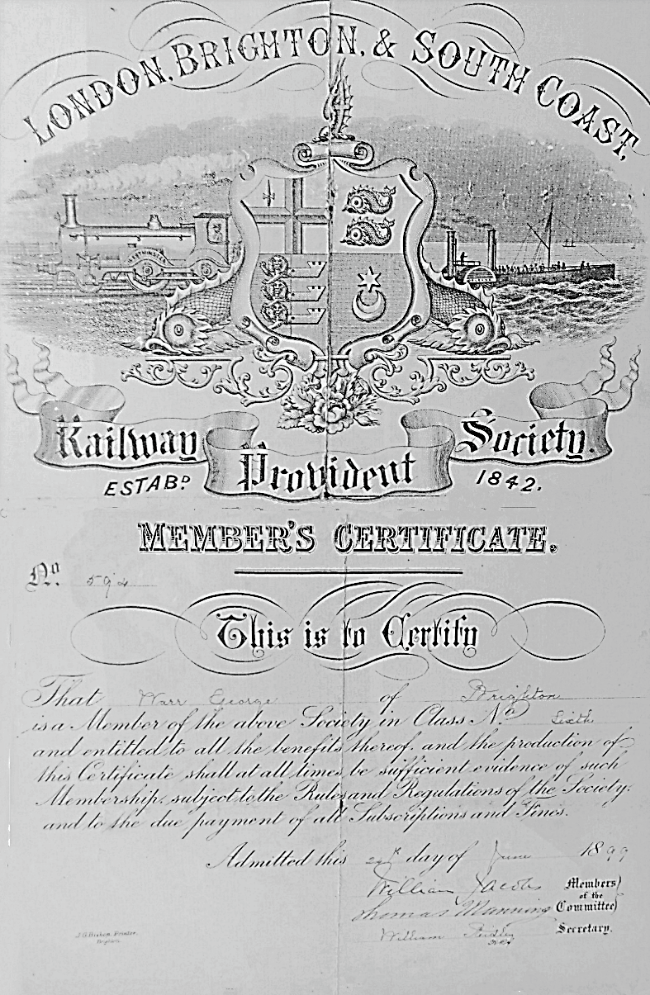
STORIES FROM THE SHOVEL
extracted from RTCS book on locomotives of the LBSCR
On the 8th June, 1872, Driver Mills lost two fingers whilst oiling round his loco at Tunbridge Wells shed as a result of a sudden movement despite the regulator being firmly closed and the handbrake on.
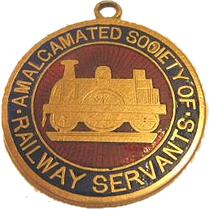
On the 26th November 1871 a group of railwaymen held a meeting in Leeds, they made
the decision which resulted in the establishment of the Amalgamated Society of Railway
Servants.
Within the next two weeks, further meetings in London enthusiastically endourced the launching of the new Society such as that at the Winchester Arms, 63 Southwark Street, London.
"A meeting will be held at the Winchester Arms, 63 Southwark Street, on Sunday December 3rd (1871) to further the objects of securing ten hours for a day's labour, payment for Sunday duty and weekly payment of wages. Chair to be taken at 6 o'clock. Please inform mates and solicit them to attend. “
Printed on tiny slips of paper four inches by two inches, in order not to attract the attention of the employers, this was the message passed between railwaymen that led to the forming of the Amalgamated Society of Railway Servants.
Despite the justified caution of the founders (there was an early proposal for a secret sign and
password for the union) the union found a substantial support from railway workers and
even "progressive" Member of Parliament such as Michael Thomas Bass (Derby) and his agent Charles Bassett Vincent who helped and encouraged railway to organise and fund the
influential "Railway Service Gazette" forerunner of the " Railway Gazette”
By 1872 the Engine Drivers and Firemen’s Society had been amalgamated with other
Friendly societies and become apart the Amalgamated Society of Railway Servants to
protest to parliament over the excessive hours Railway workers were expected to endure.
However as this Society was made up of all grades of railway workers it became very
ineffective in achieving any improvements and its membership very quickly decreased.
At the first meeting of the Amalgamated Society of Railway Servants saw delegates from the London Brighton & South Coast Railway in attendance were;
J.T. Gladwin, Brighton; R. Whitmore, Battersea; E.W. Champion, Bermondsey & W. Reeves, Crystal Palace. Their grades within the company are not known
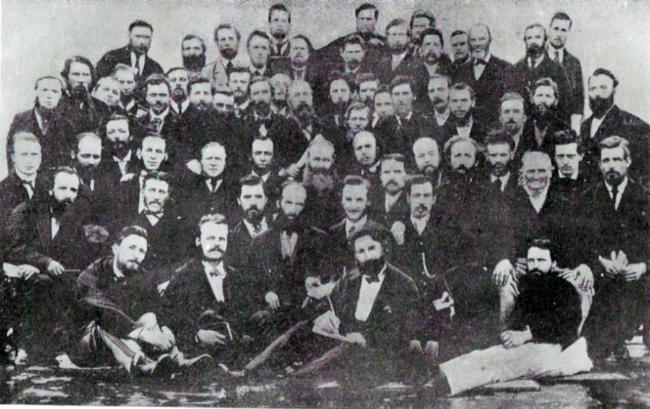
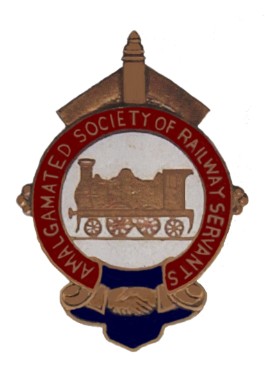
South Hayling Loco Shed
1872 - 1894
The South Hayling Loco shed was formerly located at Petworth (closed in 1867), were it was dismantled and re-erected at Hayling Island in 1872. The shed was a timber built with one track straight shed
Railway accidents on the
L.B.S.C.R.
from http://www.railwaysarchive.co.uk
AMALGAMATED SOCIETY OF RAILWAY SERVANT
Founded 1871
1913 amalgamated to become the National Union of Railwaymen
In 1872 branches of the A.S.R.S. were formed on the L.B.S.C.R., these branches included Enginemen and railwaymen from all the various railway grades within the L.B.S.C.R.
NEW CROSS
BATTERSEA
BRIGHTON No.1
CROYDON
BRIGHTON